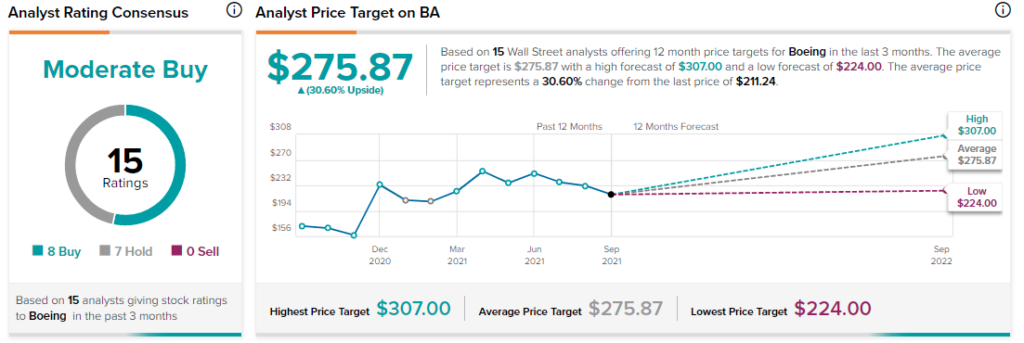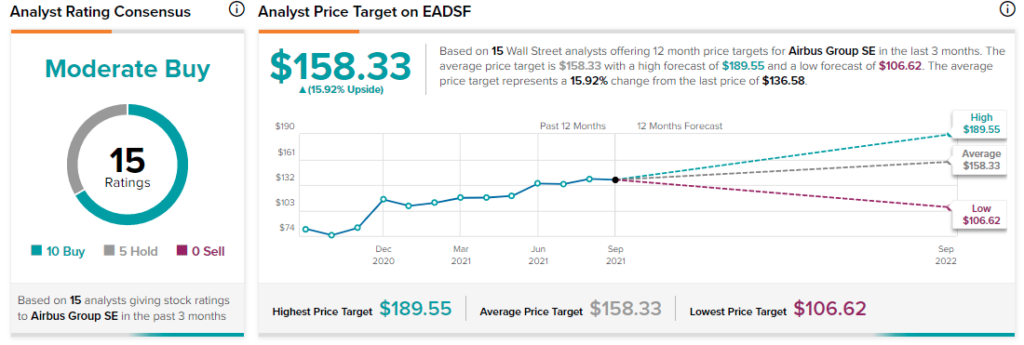The aerospace industry is still barely recovering from the adverse effects of the COVID-19 pandemic.
According to a Deloitte report, while the commercial aerospace sector is expected to recover, travel is unlikely to return to pre-pandemic levels until 2024.
Using the TipRanks Stock Comparison tool, let’s compare two aerospace companies, Boeing (BA) and Airbus (EADSF), and see how Wall Street analysts feel about these stocks.
I am neutral about both stocks listed in this article.

Boeing
Boeing’s woes seem to be compounded this year. Just as the company was recovering from the COVID-19 pandemic post Q2 results, the company now seems to be losing customers over pricing issues.
Recently, the Irish low-cost carrier Ryanair Holdings Plc (RYAAY) ended its negotiations with Boeing for a follow-on order for 737 MAX10 aircrafts over pricing issues. However, Ryanair will take delivery of around 200 of BA’s B737 “Gamechanger” aircraft over a span of five years, from 2021 to 2025.
Ryanair CEO Michael O’Leary said, “Boeing have a more optimistic outlook on aircraft pricing than we do, and we have a disciplined track record of not paying high prices for aircraft.”
He added that he did not share the company’s “optimistic pricing outlook, although this may explain why in recent weeks other large Boeing customers such as Delta and Jet2, have been placing new orders with Airbus, rather than Boeing.”
According to Boeing’s orders and deliveries data, the company had 5,070 unfulfilled orders through July 31. Year-to-date, BA has delivered 184 aircrafts. (See Boeing stock charts on TipRanks)
Robert W. Baird analyst Peter Arment estimates that BA has delivered around 18 aircrafts in the month of August based on his proprietary checks. According to the analyst, combining the August deliveries with 28 aircraft deliveries in July, makes it seem that the consensus estimate of 111 deliveries in the third quarter could be too high.
The analyst has a Buy rating, and a price target of $306 (42.8% upside) on the stock.
Meanwhile, China’s regulatory ban on 737 Max continues. The company’s 737 Max aircrafts had run into regulatory trouble in different countries after a string of accidents involving the aircraft. Seventeen regulators in various countries have lifted the ban, with China still yet to budge.
However, last month, according to a South China Morning Post report, a BA 737 Max did a test flight in China in a bid to end a regulatory ban of two and a half years.
Following the report, Cowen analyst Cai von Rumohr believed that China needs to and will certify the 737 Max, “but possibly not by BA’s [year end] target given deteriorating U.S.-China relations.” According to the analyst, the 737 made up 56% of China’s narrow-body aircraft deliveries between 2016 to 2018.
The analyst estimates that China will need 275 to 300 new narrow-body aircrafts each year, if its air traffic growth recovery hits high single-digits this year. As a result, Rumohr is “skeptical BA can hit its indicated 31/month 737 rate in Q1 [of next year] given its ~365 completed 737’s in inventory & uncertain Chinese prospects.”
Rumohr reiterated a Buy rating, and a price target of $290 (35.4% upside) on the stock.
Turning to the rest of the Street, analysts are cautiously optimistic about Boeing, with a Moderate Buy consensus rating, based on eight Buys and seven Holds.
The average Boeing price target of $275.87 implies 30.6% upside potential from current levels.

Airbus Group SE
Airbus’ reportable business segments include Airbus, Airbus Helicopters, and Airbus Defense and Space. The company posted revenues of €24.6 billion in H1, a jump of 30% year-over-year. Airbus reported H1 adjusted EBIT of €2.7 billion versus an adjusted EBIT loss of €945 million in the same period of last year.
The rise in revenues was driven by higher commercial aircraft deliveries. Airbus delivered 297 commercial aircrafts in the first half of the year, indicating that the company was on its way to recovering from the impact of the pandemic.
Airbus CEO Guillaume Faury said in the company’s press release that the company’s strong performance in the first half of the year had prompted it to raise its guidance for FY21, though it continued to face “an unpredictable environment.”
In 2021, Airbus is targeting 600 commercial aircraft deliveries, and is projecting an adjusted EBIT of €4 billion. (See Airbus stock charts on TipRanks)
Deutsche Bank analyst Christophe Menard came away bullish, with a Buy rating, and a price target of €131 (14.7% upside) following the H1 results. According to the analyst, Airbus’ Q2 adjusted EBIT of €2 billion came in 27% ahead of consensus expectations.
Menard believes this was a “result of potent cost containment and competitiveness measures at Airbus commercial that need further detailing.”
Moreover, Airbus said in its H1 shareholder letter that it intends to launch a freighter derivative of the A350 aircraft, and Menard is of the opinion that the launch “underpins some launch orders having been booked and yet to be announced.”
Turning to the rest of the Street, analysts are cautiously optimistic about Airbus, with a Moderate Buy consensus rating, based on 10 Buys and five Holds.
The average Airbus price target of $158.33 implies 15.9% upside potential from current levels.

Bottom Line
While analysts are cautiously optimistic about both stocks, based on the upside potential over the next 12 months, Boeing seems to be a better buy.
Disclosure: At the time of publication, Shrilekha Pethe did not have a position in any of the securities mentioned in this article.
Disclaimer: The information contained in this article represents the views and opinion of the writer only, and not the views or opinion of Tipranks or its affiliates, and should be considered for informational purposes only. Tipranks makes no warranties about the completeness, accuracy or reliability of such information. Nothing in this article should be taken as a recommendation or solicitation to purchase or sell securities. Nothing in the article constitutes legal, professional, investment and/or financial advice and/or takes into account the specific needs and/or requirements of an individual, nor does any information in the article constitute a comprehensive or complete statement of the matters or subject discussed therein. Tipranks and its affiliates disclaim all liability or responsibility with respect to the content of the article, and any action taken upon the information in the article is at your own and sole risk. The link to this article does not constitute an endorsement or recommendation by Tipranks or its affiliates. Past performance is not indicative of future results, prices or performance.
















